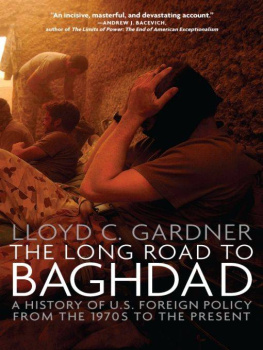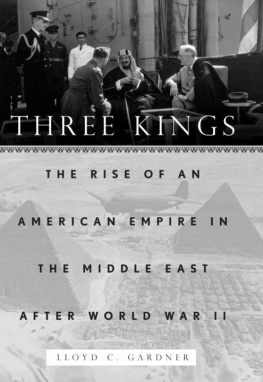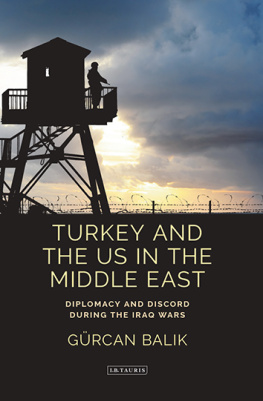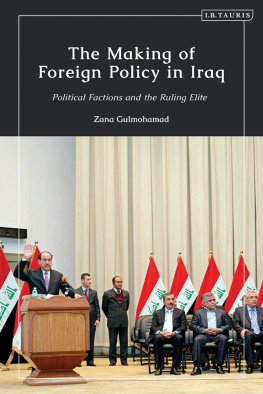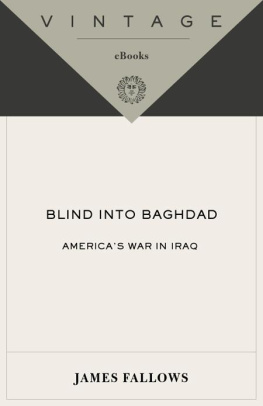Table of Contents
Also by Lloyd C. Gardner
Economic Aspects of New Deal Diplomacy
Architects of Illusion: Men and Ideas in American Foreign Affairs, 1941-1949
The Creation of the American Empire
(with Walter LaFeber and Thomas McCormick)
American Foreign Policy Present to Past
Looking Backward: A Reintroduction to American History
(with William ONeill)
Imperial America: American Foreign Policy, 1898-1976
A Covenant with Power: America and World Order from Wilson to Reagan
Safe for Democracy: The Anglo-American Response
to Revolution, 1913-1923
Approaching Vietnam: From World War II to Dienbienphu
Spheres of Influence: The Great Powers Partition Europe from Munich to Yalta
Pay Any Price: Lyndon Johnson and the Wars for Vietnam
The Case That Never Dies: The Lindbergh Kidnapping
Edited by Lloyd C. Gardner
The Great Nixon Turnaround
America in Vietnam: A Documentary History (with Walter LaFeber, Thomas McCormick, and William Appleman Williams)
Redefining the Past: Essays in Honor of William Appleman Williams
On the Edge: The Early Decisions in the Vietnam War (with Ted Gittinger)
International Perspectives on Vietnam (with Ted Gittinger)
Vietnam: The Search for Peace (with Ted Gittinger)
The New American Empire: A 21st Century Teach-In on U.S. Foreign Policy
(with Marilyn B. Young)
Iraq and the Lessons of Vietnam: Or, How Not to Learn from the Past
(with Marilyn B. Young)
To my grandchildren,
Jamie, Dylan, Kyle, and Asha
To contemplate war is to think about the most horrible of human experiences. On this February day, as this nation stands at the brink of battle, every American on some level must be contemplating the horrors of war.
Yet, this Chamber is, for the most part, silentominously, dreadfully silent. There is no debate, no discussion, no attempt to lay out for the nation the pros and cons of this particular war. There is nothing.
We stand passively mute in the United States Senate, paralyzed by our own uncertainty, seemingly stunned by the sheer turmoil of events. Only on the editorial pages of our newspapers is there much substantive discussion of the prudence or imprudence of engaging in this particular war.
And this is no small conflagration we contemplate. This is no simple attempt to defang a villain. No. This coming battle, if it materializes, represents a turning point in U.S. foreign policy and possibly a turning point in the recent history of the world.
Senator Robert F. Byrd, February 12, 2003
ACKNOWLEDGMENTS
No man is an island, and no book is ever written without inspiration from friends and colleagues. In writing about contemporary subjects, moreover, no book is written without the Web. The ability to access documents and articles in a trice is real fun and encourages an author enormously. What happens then, of course, is the hard work. Walter LaFeber, Thomas McCormick, and I began a conversation more than fifty years ago in graduate school. It continues to this day. Warren Kimball keeps my eyes and ears open for the impact of nationalism and political economy. Paul Miles enlightens me during our lunch discussions on all sorts of topics related to the military and other questions. Gerry MacCauley is an agent for all seasons.
In recent years I have enjoyed collaborating with Marilyn Young on two readers published by The New Press. Our work on those books was instrumental in my willingness to undertake this project, and it has profited from her comments on early drafts of many of the chapters. At The New Press, Marc Favreau has seen the book develop from our first discussions through its evolution to the final product. His suggestions and those of the copy editor, Rachel Burd, have sharpened my ideas, and made it a better read, I hope. My wife, Nancy, is the title master in the family, and she has done it again. For all this help, and for her love, I am very thankful.
INTRODUCTION
On the eve of war, George W. Bush confided to the Spanish prime minister that Saddam Hussein was testing him and America. He thinks that I am very weak. But the people around him know that things are otherwise. They know his future is in exile or a coffin. Defense Secretary Donald Rumsfeld also liked to think out loud about the personal challenges ahead. He had wanted to get rid of the Iraqi dictator even before the fateful attacks on 9/11. But he was more intrigued about how the earth looked from an observation point far away. He showed visitors a satellite picture of the two Koreas taken at night that he kept under a clear plastic cover on his desk. Rumsfeld delighted in pointing out how the south was a blaze of lights, while in the north only Pyongyang, the capital, showed up, as a pinpoint against the vast dark background. The comparison between the light and dark places, he believed, explained the world and where matters stood. Anyone looking down from Mars sees that the countries that are providing the greatest opportunity for people are the freer countries. The threat to Western culture, therefore, emanated from all those who hated such freedoms, and who lived in the dark places. It isnt just the United States, he argued, that faced such threats, its a way of life.
Breaking Saddam Husseins grip on Iraq was the right thing to do, but only an intermediary goal in the New American centurys mission for the worlds benefit. That should have been apparent from the aftermath of the brief war that toppled the Taliban regime in Afghanistan, when the decision was made to stop chasing Osama bin Laden and shift resources for an attack on Iraq. In early 2002, at the time of President Bushs axis of evil State of the Union speech, this shift was well under way, as Senator Bob Graham would tell the Council on Foreign Relations; he was let in on the secret after a briefing at the headquarters of the Central Command at MacDill Air Force Base. Senator, one of the commanders confided, we have stopped fighting the war on terror in Afghanistan. We are moving military and intelligence personnel and resources out of Afghanistan to get ready for a future war in Iraq. He explained that pursuing the originator of the 9/11 attacks was not what they were trained to do, Senator, what we are engaged in now is a manhunt, not a war, and we are not trained to conduct a manhunt.
There would be many other explanations of why the search for Osama bin Laden failed to reach the al Qaeda leaders lair. The day of the 9/11 attacks Rumsfeld would propose going after Saddam Hussein at the same time. Sweep it all up, he would say. There arent any good targets in Afghanistan and there are lots of good targets in Iraq. What were those targets? Certainly Rumsfeld did not want to bomb the oil fields, and indeed Gulf War II was planned so that there would be no repeat of what had happened in the earlier war, when Hussein managed to set a great many oil fields afire. Supposedly no one really knew where the suspected weapons of mass destruction were actually located, though Rumsfeld would claim he knew in general the area where they were hidden.
So what were the targets for bombing?
That is the central question I am concerned with in the chapters that follow. The road to Iraq began, I will argue, in the aftermath of the Vietnam War. During that war Walt Whitman Rostow represented a strong tradition in American thought about the nature of revolutions and the need for outside forces to kick off the process of economic growth in what were labeled backward areas. In Woodrow Wilsons time, his confidante, Colonel Edward M. House, attempted to stave off a world conflagration by enlisting the industrial powers then at odds, Germany and Great Britain, to join in a sort of coalition of the willing to take charge of what he called in his diary the waste places of the earth. He failed, of course, but the idea was at the center of the American sacred metaphor of progress.

